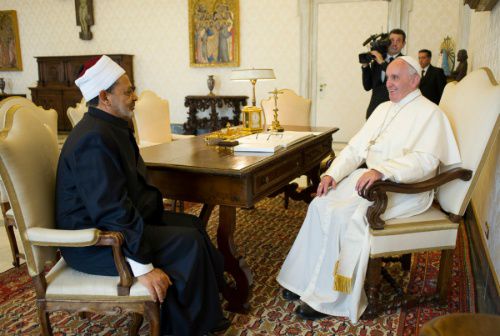After his historic meeting with Pope Francis at the Vatican Monday, Egypt's Grand Imam of al Azhar issued a global appeal to counter terrorism, which he said is “deviant” of true Islam and threatens the both east and west alike.
“I come from the Middle East where I live and I suffer, along with others, the consequences of the rivers of blood and cadavers, and there is no logical reason for this catastrophe that we are living day and night,” Imam Ahmed al Tayyeb told Vatican Radio in an interview published May 24.
He acknowledged that terrorism exists, but stressed that “Islam has nothing to do with this terrorism, and this applies to Ulama Muslims and to Christians and Muslims in the East.”
“Those who kill Muslims, and who also kill Christians, have misunderstood the texts of Islam either intentionally or by negligence.”
Al Tayyeb issued a global appeal asking that the entire world to “close ranks to confront and put an end to terrorism.” If the growing problem of terrorism is neglected, it’s not just the east that will pay the price, but “both east and west could suffer together, as we have seen.”
When it comes to terrorism in the Middle East, the imam advised that the issue ought not to be presented only as a persecution of Christians because “there are more Muslim than Christian victims, and we all suffer this catastrophe together.”
“Therefore this is my appeal to the world and to the free men of the world: to come to an agreement immediately and to intervene to put an end to these rivers of blood,” he said, and cautioned against generalizing an entire religion in light of a deviant few.
“We must not blame religions because of the deviations of some of their followers, because in every religion there exists a deviant faction that raises the flag of religion to kill in its name.”
The imam’s interview, conducted in Arabic, came after he met Pope Francis during an official visit to the Vatican Monday, May 23, marking seismic leap in Catholic-Muslim relations.
Currently Ahmed al Tayyeb, the Imam of al Azhar is considered by some Muslims to be the highest authority in Sunni Islam and oversees Egypt’s al-Azhar Mosque and the prestigious al-Azhar University attached to it.
Founded in the Fatimid dynasty in the late 10th century together with the adjoining mosque, the university is one of the most renowned study centers for the legal principals of Sunni Islam.
Monday’s meeting between the two is widely considered as a thawing of relations between the al-Azhar institution and the Holy See, which were strained in 2011 with claims that Benedict XVI had “interfered” in Egypt’s internal affairs by condemning a bomb attack on a church in Alexandria during the time of Coptic Christmas.
During the 30 minute encounter the Pope and the Imam focused largely on the commitment of both faithful and authorities of major religions in working for peace, the rejection of violence and terrorism and the protection of Christians in the Middle East given their current state of persecution.
In hi interview with Vatican Radio, Al Tayyeb said he was happy to be the first Imam of al Azhar to come to the Vatican and meet with the Pope in “an encounter of discussion and understanding.”
His first impression of Pope Francis which he said was “very strong,” was that this is “a man of peace, a man who follows the teaching of Christianity, which is a religion of love and peace.”
In following the words and actions of the Pope, “we have seen that he is a man who respects other religions and shows consideration for their followers; he is man who also consecrates his life to serve the poor and the destitute, and who takes responsibility for people in general,” he said.
Al Tayyeb also spoke of the importance of role of religious leaders amid modern social ideologies which have failed to both failed make man happy or dissuade him from war and bloodshed. He also outlined a special project at the renown al Azhar University aimed at renewing scholastic texts.
He said the texts are renewed in the sense that “we clarify the Muslim concepts that have been deviated by those who use violence and terrorism, and by armed movements that claim to work for peace.”
“We have identified these erroneous concepts,” and have included them as part of their high school and middle school curriculum, he said.
In addition to showing the deviant perspective of Islam, the university seeks to help their students understand the true concepts from which terrorists and extremists have deviated.
Additionally, the imam explained that the university has established a world observatory which monitors the materials distributed by extremis movements in eight languages, in order to track the “distorted ideas” that deviate youth from true Islam. The material is then corrected and translated into other languages, he said.
Al Tayyeb highlighted other efforts being made in this regard at the university before concluding with an expression of appreciation for his meeting with the Pope, as well as his hope for the future of dialogue between Islam and Christianity.
He voiced his hope that Muslims and Christians, specifically Al-Azhar and the Vatican, would be able to “relieve human beings wherever they are, regardless of their religion and belief, and to save them from destructive wars, poverty, ignorance and disease.”
The full text of Vatican Radio’s interview with Grand Imam Ahmed al Tayyeb can be found here: http://en.radiovaticana.va/news/2016/05/24/grand_imam_religions_must_work_together_for_peace/1232088

